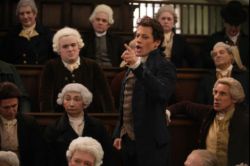Mark:
Originally released in Britain in March 2007 to coincide with the 200th anniversary of the passing of The Slave Trade Act which it commemorates, Amazing Grace is a moving yet flawed film that is lifted by a cast containing Albert Finney, Michael Gambon and Ciarán Hinds in addition to the younger brigade of Ioan Gruffudd, Romola Garai and Benedict Cumberbatch. Were it not for their stirling efforts, Amazing Grace may have become bogged down in mawkish sentiment, but this cast is universally superb.
 Commencing in the 18th century, Amazing Grace is a version of the life story of William Wilberforce, the young politician whose tireless efforts throughout his life eventually led to the successful passage of ‘An Act for the Abolition of the Slave Trade’ in 1807. Although some may criticise the film for its take on who and what occurred, this is primarily a biopic of Wilberforce, and as such is prone to focussing all its energy on his acts. This is amplified by the structure of the narrative – introductory scenes are followed by flashbacks through the eyes of Wilberforce, and then the ‘real time’ is again followed after both the audience, and Wilber’s inamorata Barbara, are caught up.
Commencing in the 18th century, Amazing Grace is a version of the life story of William Wilberforce, the young politician whose tireless efforts throughout his life eventually led to the successful passage of ‘An Act for the Abolition of the Slave Trade’ in 1807. Although some may criticise the film for its take on who and what occurred, this is primarily a biopic of Wilberforce, and as such is prone to focussing all its energy on his acts. This is amplified by the structure of the narrative – introductory scenes are followed by flashbacks through the eyes of Wilberforce, and then the ‘real time’ is again followed after both the audience, and Wilber’s inamorata Barbara, are caught up.
Wilberforce’s story is powerfully portrayed by Ioan Gruffudd, whose choice of intellectual counterbalance to his role in the abysmal Fantastic Four series cannot be faulted. The ‘true story’ of an 18th century evangelical leading a crusade against slavery almost excuses the rubbery antics of Mr Fantastic. The author of the beloved hymn from which the title comes, John Newton, is played beautifully by Albert Finney, and others like Prime Minister William Pitt (Benedict Cumberbatch) and abolitionist Thomas Clarkson (Rufus Sewell) add substance in minor roles. Michael Gambon as Lord Charles Fox is somewhat inscrutable, although he makes the most of the climactic scenes late in the film, and Ciarán Hinds is excellent as Lord Tarleton, the leader of the anti-abolitionists.
The problems in Amazing Grace are several. Firstly, the romance that develops between Wilberforce and Barbara is somewhat hard to believe, and it is with a sense of irony that the audience must accept Wilber’s statement that ‘Barbara and I have discovered that we’re both impatient and prone to rash decisions’ on announcing their intention to wed after an abrupt courtship. (That they did actually marry within 6 weeks of meeting notwithstanding.) The role of Barbara is underdone, although Garai does a beautiful job with what is she is given. Additionally, the rather overtly sentimental final scenes could be viewed as emotionally manipulative by some, but may move others to tears – as it did this reviewer.
Although not a perfect film, and suffering from many of the common complaints that plague biopics, the excellent cast make this an enjoyable and moving experience. And Gruffudd shows he really can act, in spite of his role in the Fantastic Four series.
Rating: